
| SEPTEMBER, 2008 - VOLUME 16 NO.9 |
THREE years after profiling Burma’s most successful tycoons in its September 2005 issue, The Irrawaddy is again directing attention to the men who govern the country’s business world. They continue to prosper, and have been joined by others, yet they are coming increasingly under the international spotlight and critical scrutiny.
Many of those who featured in our September 2005 issue found themselves on another list last year—penalized by US and EU sanctions because of their relationship with, and unquestioning support for, Burma’s military regime.
The sanctions list contained such names as Tay Za and his elder brother, Thi Ha; Asia World’s director Tun Myint Naing; Aung Thet Mann, whose father is the regime’s third most powerful general; and Khin Shwe, who faithfully attended the regime-sponsored National Convention and is well connected to the top junta leaders.
They were penalized by the US shortly after the regime they so assiduously back brutally suppressed demonstrations last September demanding changes that would advance prosperity and freedom for all, not just a favored clique.
The US sanctions were also clamped on 25 top military generals and ministers who keep the tycoons in business—including the junta’s triumvirate of Snr-Gen Than Shwe, Vice Snr-Gen Maung Aye and Gen Thura Shwe Mann.
The targeted sanctions were applied under Washington’s Burmese Freedom and Democracy Act, which came into force in July 2003 after junta-backed thugs ambushed opposition leader Aung San Suu Kyi and her supporters in Depayin, Sagaing Division.
Although the list of military leaders, family members and their business cronies is long, many other names deserve to be added to it. There are also doubts whether the sanctions have a real effect on the privileged lifestyle of the generals and their business cronies. They continue to enjoy the good life while the masses live in poverty.
By naming these members of an uncaring caste, we hope to shame them. It won’t be the last list we’ll publish—the clique is growing, but so is international awareness of its members’ perfidious practices.
The Irrawaddy
Tay Za
Htoo Trading Company
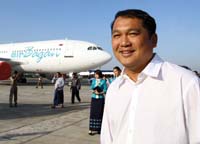 |
Tay Za (Photo: AFP) |
Tay Za’s connection to the regime is the key to his success. He is known to be close to Burma’s top leaders, including Snr-Gen Than Shwe and Gen Shwe Mann.
Than Shwe once stayed at Tay Za’s beach resort in Ngwe Saung and the senior general was reportedly impressed by his meeting with the young tycoon there. Since then, Tay Za has been offered more and more lucrative business concessions.
Tay Za, or Teza, is especially close to Gen Shwe Mann, who he has known since the general was regional commander in the Irrawaddy delta.
After setting up the Htoo Company in the early 1990s, Tay Za dramatically expanded his business empire by working closely with the military regime. Myanmar Avia Export Co Ltd, a company he created to supply the Burmese military with spare parts for its aircraft, is Burma’s sole representative of Russia’s Export Military Industrial Group, known as MAPO, and of the Russian helicopter company Rostvertol.
Because of his Russian connections, he was said to be instrumental in the junta’s purchase of advanced MiG-29 fighter-bombers and military helicopters. The company denied this, saying it helped to purchase only civilian helicopters for the regime.
Last year, Tay Za expanded his empire by entering the airline business with the launch of Air Bagan, which began its operations with domestic and regional routes.
Faced with US sanctions in October 2007, however, the airline suspended its flights to Singapore, citing the effects of the punitive measures.
Tay Za’s wife, Thida Zaw, and oldest son, Pye Phyo Tay Za, were also put on the sanctions list. His son’s lavish lifestyle in Singapore was exposed by pro-democracy blog sites, causing an outcry. Thida Zaw recently bought the London Cigarette Company and is believed to control Burma’s tobacco industry.
During the crackdown in September 2007, a rumor spread that Tay Za had helped Than Shwe’s wife, Kyaing Kyaing, and members of her family to fly to Dubai to seek refuge there. Tay Za’s relatives denied the rumor, saying that although Tay Za and business associates traveled to Dubai during the turmoil in Rangoon, Kyaing Kyaing was not with them.
Despite the sanctions, the young tycoon is still thriving in Burma’s struggling economy. His company claims that it spent about US $3 million on rescue and rehabilitation work following Cyclone Nargis. Observers noted that Tay Za received lucrative trade concessions from the junta in exchange for donations to the relief effort.
Tun Myint Naing (aka Steven Law)
Asia World Co
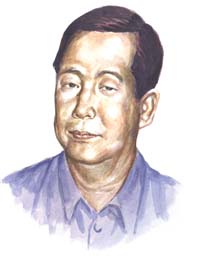 |
| Tun Myint Naing (Illustration Harn Lay/The Irrawaddy) |
Asia World was founded on June 5, 1992, and has developed into the country’s biggest business conglomerate, with interests ranging from transport to construction and retailing. The company’s many government contracts include road building in Shan State, the renovation of Rangoon’s international airport, and the construction of a deepwater port and toll highways.
Tun Myint Naing and Lo Hsing Han were put on the US sanctions lists in February 2008, along with their companies Asia World Co Ltd, Asia World Port Management, Asia World Industries Ltd and Asia World Light Ltd.
Golden Aaron Pte Ltd and nine other Singapore-based companies managed by Tun Myint Naing’s wife Cecilia Ng were also targeted, as was Ng herself.
Golden Aaron Pte Ltd is associated with a contract between Myanmar Oil and Gas Enterprise and a business group—including the China National Offshore Oil Company Myanmar Ltd—to carry out oil and gas exploration in Kyauk Phyu, Arakan State.
Asia World built a port for cargo ships on the island of Ramree specifically to service China’s shipping needs. The port at Kyauk Phyu was connected to a new 1,950-km (1,220-mile) highway to be built through Burma directly to Kunming, the capital of China’s Yunnan Province.
Asia World has been assigned to build hydropower projects across the country and is now involved in constructing the Myit Sone hydropower project, 42 km (26 miles) north of Myitkyina, the capital of Kachin State.
Company business is still going strong, thanks to Tun Myint Naing’s connections in China. Beijing has no interest in imposing sanctions on Burma as long as it enjoys a special relationship with the Burmese regime and its cronies.
The company maintains a very close relationship with the regime. Tun Myint Naing recently accompanied Snr-Gen Than Shwe on a visit to cyclone-affected areas of the Irrawaddy delta and has been given contracts for reconstruction projects in the region.
Zaw Zaw
Max Myanmar Group of Companies
Zaw Zaw, 42, is the managing director of the Max Myanmar Group of Companies, which he founded in 1993.
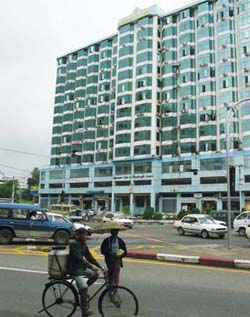 |
| (Photo: Cristina Dorada/The Irrawaddy) |
Like Tay Za and Tun Myint Naing, Zaw Zaw played a very visible role in the aftermath of Cyclone Nargis. The three top businessmen accompanied senior generals on trips to the devastated Irrawaddy delta and were instructed to contribute to reconstruction projects in the region. According to Burmese media reports, Max Myanmar contributed $1.6 million to the relief effort.
Besides his business interests, Zaw Zaw is the chairman of the Myanmar Football Federation and the Myanmar Tennis Federation. He is considered to be very close to the grandson of Than Shwe.
Pyi Aung & Nay Aung
Aung Yee Phyo Co Ltd and IGE Co Ltd
Brothers Nay Aung and Maj Pyi Aung, two rising businessmen, are no strangers to the world of crony business in Burma. They are the sons of Aung Thaung, the powerful Minister for Industry (1). Aung Thaung, a known hardliner in the cabinet, is close to both Than Shwe and Vice Snr-Gen Maung Aye. His son, Pyi Aung, is married to Nandar Aye, daughter of Maung Aye.
Pyi Aung and Nay Aung founded Aung Yee Phyo Co Ltd and IGE Co Ltd, gaining a foothold in the oil, gas, agricultural products and timber trading industries. IGE was established in 1994 and registered in Singapore in 2001, when the company opened its office in Shenton Way, an exclusive area of the Lion City.
IGE is one of Burma’s leading companies. It is a major supplier of materials used in the construction of electrical substations and transmission lines, and sells equipment and machinery to both private- and public-sector companies in the oil and gas industry. It also provides compressed natural gas (CNG) filling stations for government projects. The company exports rice and imports machinery and spare parts for electrical generating projects, as well as steel, fertilizers and chemicals.
In March 2007, IGE signed a contract with little-known Rimbunan Petrogas Ltd, a partner in a joint venture with the state-owned Myanmar Oil and Gas Enterprise to explore for offshore oil and gas in Block A, off the Arakan coast. According to a report in The New Light of Myanmar newspaper, Rimbunan Petrogas Ltd is registered in the British Virgin Islands.
The two brothers reportedly own three US-made Hummers, the civilian version of the military Humvee. They are banned from traveling to Australia or the European Union, but have managed to avoid becoming targets of US sanctions by maintaining a low profile.
Aung Thet Mann
Ayer Shwe Wah Company
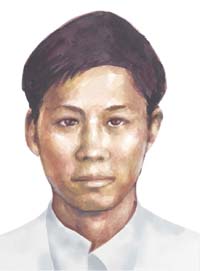 |
| Aung Thet Mann (Illustration Harn Lay/The Irrawaddy) |
When his father, Gen Thura Shwe Mann, was the regional commander in Irrawaddy Division, Aung Thet Mann received lucrative government contracts to supply fertilizers to farmers throughout the delta region. More recently, his company has been involved in construction projects in the new administrative capital of Naypyidaw.
Ayer Shwe Wah is a subsidiary of Htoo Trading Company, which Aung Thet Mann joined in 1997 after he was recruited by CEO Tay Za. In 2001, the regime gave Ayer Shwe Wah more than 30,000 acres of wetlands and rice paddy in the delta region. In 2005, it became the first private company to receive permission to export rice to Bangladesh and Singapore.
Business rivals accuse Aung Thet Mann of using access to government supplies of cheap cement to underbid them for construction contracts related to the Defense Ministry’s relocation to Naypyidaw.
In an interview with The Irrawaddy, Aung Thet Mann claimed that he provided $1 million in emergency aid to victims of Cyclone Nargis. He also called for more international assistance and urged the US to lift its sanctions. Last year, the US placed his company on the sanctions list.
His younger brother, Capt Toe Naing Mann, also has close connections to the business community. He is married to the daughter of another tycoon, Zaykabar Khin Shwe.
Michael Moe Myint
Myint & Associates Group
A former senior pilot at Myanmar Airways, Michael Moe Myint later worked at an airways equipment export company in California. He founded Myint & Associates Group Companies in 1989 and currently serves as the managing director.
 |
| (Photo: PTTEP) |
The company provides a wide range of services, including warehouse construction and rental, logistics, maintenance, procurement, equipment rental, engineering, agency representation and general services related to oil and gas exploration and production.
Myint & Associates is currently excavating raw petroleum in Minbu, Magwe Division, and is involved in the Yadana and Yetagun gas projects.
Michael Moe Myint has several international business connections. He served as a consultant and local agent for the American-owned Baker Hughes and FMC Group, Japanese-owned Mitsui & Co Ltd, McDermott International Inc, UK-owned Bredero Price International, and Thai-owned Shinawatra International.
The company’s clients include Total, Unocal, Halliburton, Premier Oil, Petronas and Daewoo.
Michael Moe Myint proudly claims that he is one of the few businessmen in Burma who pay tax to the government (about $1 million per month) and is considered to be one of the 10 richest people in Burma.
Ne Win Tun
Ruby Dragon Jade & Gems Co Ltd
 |
| Ne Win Tun (Illustration Harn Lay/The Irrawaddy) |
Ne Win Tun operates gold and gem mines in Mong Hsu in Shan State, Pha Khant and Tawmaw in Kachin State, Kawlin and Khamti in Sagaing Division and Mogok in Mandalay Division.
He has also diversified into other sectors. In 2004, his Ruby Winery Factory went into operation in Nyaung Shwe in southern Shan State, with a total investment of $3 million. In 2005, he built the Dragon Cement Factory on a 728-acre site in Tigyit, Shan State, with an initial investment of about $21 million. And in March 2007, he opened the Ruby Jade Hotel Resort and Spa in Rangoon.
 |
| (Photo: Azuna Ali/The Irrawaddy) |
Ne Win Tun is regarded as one of the 10 richest people in Burma. Observers say that it is unlikely that the US Block Burmese Jade Act of 2008 will have much impact on his gem-trading business, since most of his customers are from China.
Khin Shwe
Zaykabar Company
 |
| Khin Shwe (Illustration Harn Lay/The Irrawaddy) |
As president of the Myanmar Construction Entrepreneurs Association and chairman of the Myanmar Hotelier Association, Khin Shwe has played a major role in developing and promoting Burma’s tourism industry. He has also served as chairman of the Myanmar-Japan Friendship Association, the Myanmar-Korean Friendship Association and the Myanmar Thai Development Co.
In 1997, he hired an American PR company, Bain and Associates Inc, to improve relations with the US. However, in 2007, he was placed on the US sanctions list for his close ties to the regime.
Khin Shwe is an active supporter of the regime’s “road map” and attended the National Convention to draft a junta-friendly constitution. His daughter is married to the younger son of Gen Thura Shwe Mann, the country’s third most powerful general.
Htay Myint
Yuzana Company
Htay Myint, who founded the Yuzana Company in 1994, started out in business with investments in a fisheries venture in Mergui. He later entered Rangoon’s residential and commercial property markets, embarking on his biggest project, the Yuzana Garden City, a suburban housing development, in the mid-1990s.
The Yuzana Company has interests in a number of industries, including transportation, construction, hotel and tourism, palm oil production and rubber plantations. The company also owns the Yuzana Supermarket and Yuzana Hotel in Rangoon and has established an oil refinery in Rangoon’s Thaketa Township.
Htay Myint is also chairman of the Myanmar Fisheries Federation, president of the Construction Owners Association and president of the Fishing Vessel Owners Association. He is now on the US sanctions list.
Eike Tun
Olympic Construction Co
The managing director of Olympic Construction Co and vice president of Asia Wealth Bank (AWB), Eike Tun is an ethnic Kokang-Chinese from Shan State. He was one of the first to establish a private bank in Burma after the ruling regime introduced limited economic reforms allowing private investment in the financial sector in the early 1990s.
AWB suffered a major blow in 2003 when a banking crisis hit the country and the bank came under scrutiny from the US Treasury Department. The US imposed special sanctions on AWB because of its alleged involvement in money laundering. In March 2006, the Burmese regime forced the bank to close for failing to abide by currency regulations.
Eike Tun’s other major operation, the Olympic Construction Co, continues to thrive, however. The company invests heavily in residential property and hotel development in Rangoon. Olympic is also involved in hydroelectric projects and plans to build the Baluchaung 3 hydropower dam in Karenni State.
Chit Khaing
Eden Group
 |
| Chit Khaing (Illustration Harn Lay/The Irrawaddy) |
The regime has granted him lucrative construction projects, including government buildings. Eden Group owns the Aye Tha Yar Golf Resort in Taunggyi and numerous hotel complexes in popular tourist spots around the country.
Chit Khaing’s name rarely appears in the local media. Business sources in Rangoon claim that he is involved with Russian companies exploring for uranium and minerals in Mandalay Division and Arakan and Kachin states.
Aung Ko Win
Kanbawza Bank
Aung Ko Win is the president of Kanbawza Bank, one of the largest private banks in Burma. He also heads several other successful enterprises, including Myanmar Billion Group Co Ltd, Nilar Yoma Co Ltd, Kanbawza Hospital in Taunggyi and Shwegonedaing Specialist Client in Rangoon.
Nilar Yoma Co Ltd operates gold and gem mines in Mong Hsu in Shan State. Aung Ko Win also has a stake in a cement factory in Pimpet in southern Shan State.
Aung Ko Win, sometimes known as “Saya kyaung,” once taught the daughter of Vice Snr-Gen Maung Aye and is still believed to be close to the junta’s second most powerful general. His decision to move to Taunggyi in Shan State earlier this year fuelled speculation that Maung Aye’s influence was on the wane.
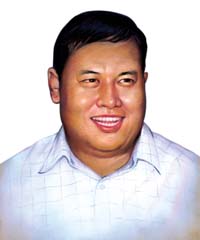 |
| Aung Ko Win (Illustration Harn Lay/ The Irrawaddy) |
Aung Ko Win is a patron of the national football squad and has donated large sums of money to the team, in addition to contributions of more than $2 million to various public projects.
Serge Pun
(aka Theim Wai)
Serge Pun & Associates (Myanmar) Limited
Serge Pun left Burma for Beijing in 1965 and spent many years in China and Hong Kong, where he began a business career in real estate.
He returned to Burma and founded the multinational Serge Pun & Associates (Myanmar) Limited in 1991. He established Yoma Bank the following year.
SPA Myanmar is a successful conglomerate of some 40 business enterprises with interests in financial services, manufacturing, technology, construction, real estate, the automotive industry and health care.
Foreign joint venture partners include multinational corporations such as the Nissan and Suzuki automobile companies and Sumitomo Corporation of Japan, as well as international private investment companies and investors from North America, Europe and Asia.
He is also chairman of First Myanmar Investment Co Ltd, a publicly traded company holding a 35.6 percent stake in Yoma Bank. Rumors circulated last September that the regime revoked the banking license for his bank and that it was subsequently unable to complete money transfers. However, the rumors proved to be untrue.
Kyaw Win
Shwe Than Lwin Company
Kyaw Win is the chairman of the Shwe Than Lwin Company, which imports vehicles, construction materials and heavy machinery to Burma. He also engages in business with ethnic insurgent groups, especially the Democratic Karen Buddhist Army, which has reached a ceasefire agreement with the regime.
Shwe Than Lwin is one of the few companies allowed to import coconut cooking oil. It is also involved in cement and agricultural projects in Irrawaddy Division and is the sole distributor of tires from Thaton Tire Industry, under the Ministry of Industry (2).
Win Aung
Dagon International Ltd
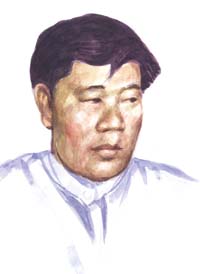 |
| Win Aung (Illustration Harn Lay/The Irrawaddy) |
He co-founded the company with former army captain Win Thein in the early 1990s to invest in construction projects in Rangoon.
Dagon International Ltd was granted a construction license to upgrade the Rangoon-Mandalay highway and extension, as well as several agricultural and irrigation projects across the country. He is also involved in the timber trade, construction and import-export. His business licenses and contracts are usually approved without delay as he has close connections with the ruling generals.
Interestingly, his partner, Win Thein, was involved in a failed assassination plot against former dictator Gen Ne Win in 1976. Win Thein became a government witness in the case against Captain Ohn Kyaw Myint, who was later sentenced to death as the leader of the would-be assassins.
In recent years, Dagon International Ltd has made its mark on Rangoon with the construction of a modern shopping complex, the Dagon Center, in the main commercial district of the city. Win Aung also invests in tourism and has opened resorts at Ngwe Hsaung beach in Irrawaddy Division.
Aung Myat
Mother Trading Company Ltd
 |
| (Photo: AFP) |
He is said to be a welcome visitor at the homes of Snr-Gen Than Shwe and Minister of Industry (1) Aung Thaung. Rumor has it that he usually pays respect to the paramount leader by always sitting on the floor and addressing him with royal titles.
Tin Win
Tin Win Tun Company
The managing director of Tin Win Tun Company is heavily involved in teak plantations and in the hotel industry. The company is ranked as the second largest timber enterprise in Burma and is a major exporter of teak and other rare hardwoods. Tin Win was closely associated with the late Prime Minister Gen Soe Win.
Maung Weik
 |
| Maung Weik (Illustration Harn Lay/The Irrawaddy) |
He stirred up controversy in 2004 with the purchase of the 44-acre Rangoon Hlaing Campus, formerly known as Regional College No. 2. The purchase was reportedly approved by then Prime Minister Gen Khin Nyunt.
He still has strong connections within senior army officers, but his future doesn’t look bright. He was recently arrested and charged with drug abuse and importing ecstasy and ketamine. He reportedly catered to wealthy young people, notably the sons of the generals. According to the semi-official Myanmar Times, he has engaged in drug trafficking from Malaysia to Burma since 2003.
Maung Weik and his young followers often threw lavish parties attended by celebrities and models, who also allegedly purchased drugs from him. As an extra service, he reportedly provided high-end prostitutes and celebrity girls to military officers.
Written by Aung Zaw. Min Lwin, Wai Moe and Ko Htwe contributed to this report.